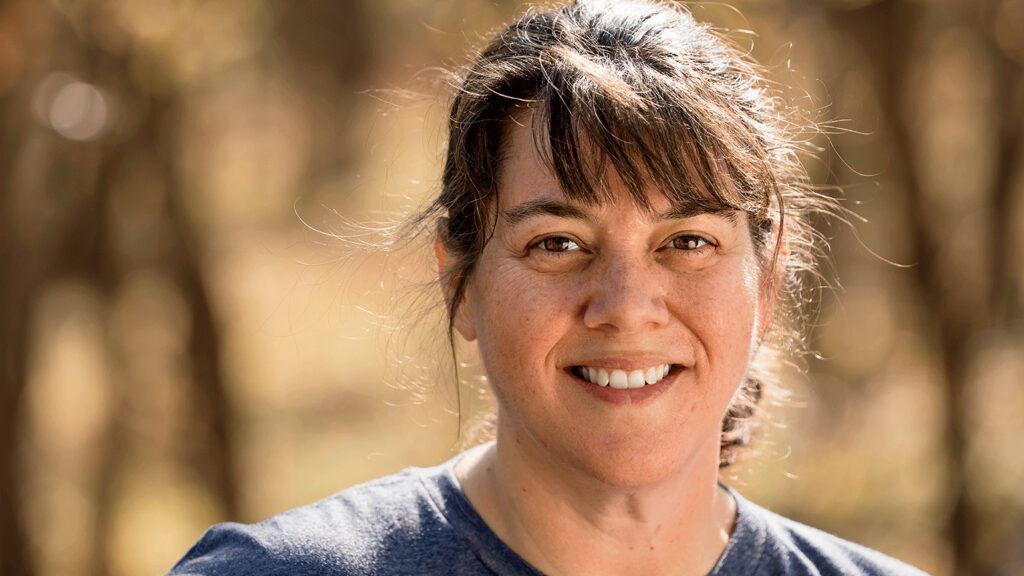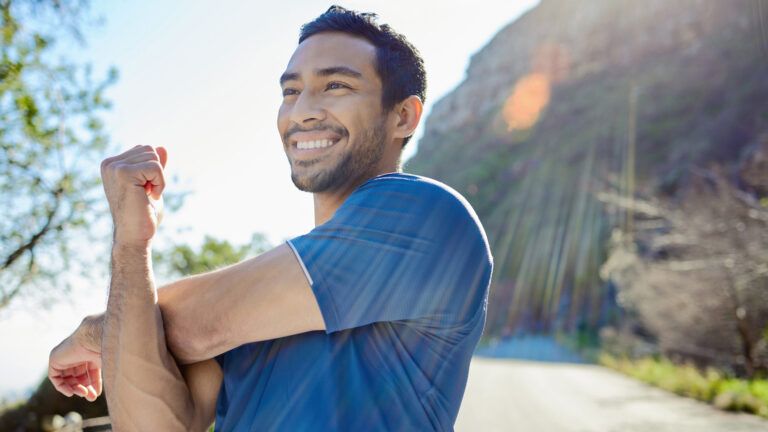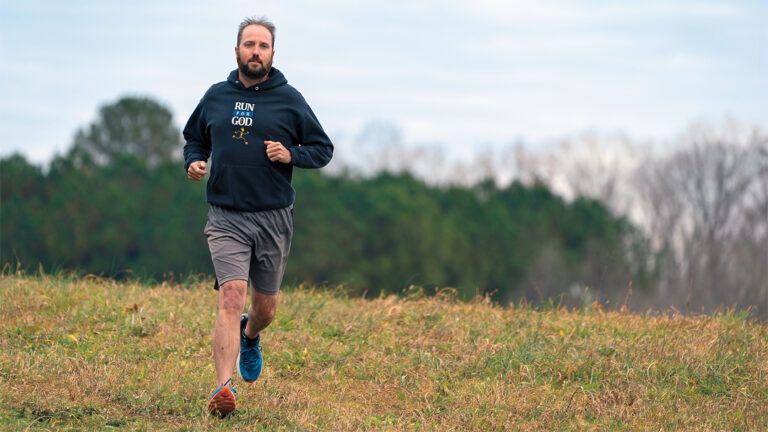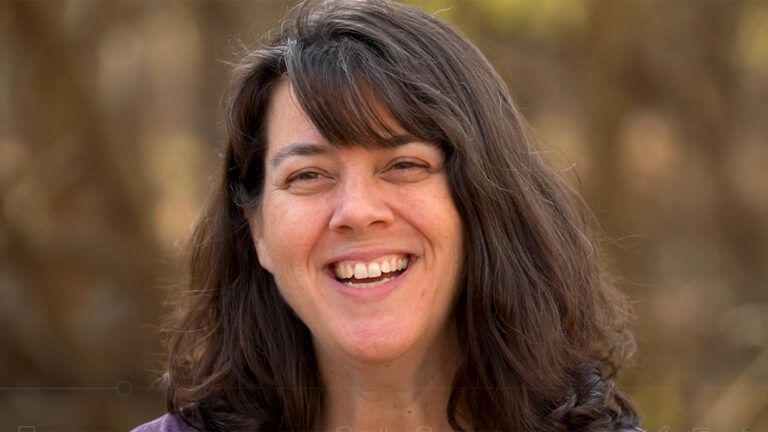I stood in my driveway and pressed start on my phone. It was my first time using a training app for beginning runners. “Walk for 90 seconds,” an encouraging female voice sang out. I started down the sidewalk.
It was mid-January, a bit warmer than usual. I’d pulled on a pair of loose stretchy pants, a baggy sweatshirt and tennis shoes. Please don’t let the neighbors see me, I thought.
At 47 years old, I couldn’t remember the last time I’d done anything physically active. I’d been overweight my whole life, and sports just weren’t my thing. I was happy to cheer on the rest of my family—my husband, who played rec league hockey, and our three always-on-the-go kids. But I wasn’t out here for myself. It was my mother I worried about. I’d do anything for her—even take up running.
Mom had suffered a severe stroke seven weeks earlier. She’d been released from the hospital to a rehabilitation center for intensive therapy. I visited almost every day. She’d made strides in verbal and cognitive areas, but she struggled with physical therapy. It was hard to see my independent mom wheelchair-bound and unable to stand. It was even harder to see the defeated look in her eyes.
“You’ve got this,” I’d cheer her on while she did her PT exercises. “Keep trying.” But progress was slow and she wasn’t happy at the rehab center, pleading, “I want to go home.” Well, who wouldn’t?
“If she doesn’t show improvement, we’ll have to discharge her,” the therapist told me. My dad went to therapy with Mom, often doing the exercises too. The grandkids came as well. I was involved in every aspect of Mom’s care plan. But how to help motivate her—I somehow needed to figure that out.
I didn’t mind the responsibility. I was used to it. I homeschooled our kids, now teenagers, making sure they got the best education I could give them. I organized events for our homeschool group. Ran our household. Played in our church praise band. Me time was never much of a priority.
Still, in the past year, I’d managed to make big changes to my health. I eliminated all refined sugar and carbs from my diet, losing 75 pounds. But exercise? No way. Especially not running. I was still haunted by memories of coming in last during every race in middle school gym class.
That’s how I’d hit upon this idea to start with. Driving home from the rehab center one day, I thought, If Mom could see me doing something physically difficult, truly pushing myself, maybe she’d be inspired to do the same. A few days later, I saw a flyer at church promoting a 5K run. Running, the thing I found most daunting. Was God sending me a message here?
First time? Get a couch to 5k app, the flyer read. I downloaded one of the apps to my phone. “Step-by-step vocal guidance,” it promised. “Go from 0 to 5K in eight weeks.” I had no intention of entering a race. I just needed some tips on how to start running.
The timer on the app sounded. The first 90 seconds were behind me. I listened for instructions for the next interval. “Run for 30 seconds.” Thirty seconds won’t be that bad, I told myself. I quickened my pace, not running exactly, but jogging. Kind of. I was breathing hard, my heart thumping.
Why hadn’t the timer gone off yet? I checked my phone to make sure the app hadn’t frozen. Ten seconds left. It seemed like forever before I heard “Walk for 90 seconds.”
“Thank you, Lord,” I gasped. But before I knew it, the app commanded me again to run.
On and on it went: 90, 30, 90, 30. I could barely catch my breath before it was time to run again. The voice I’d initially thought of as bright and cheery now sounded bossy and insistent. “I just want to go home,” I muttered, the very words I’d heard from my mother during PT. “Say ‘walk’ already, say ‘walk’!” I begged. But my digital drill sergeant had no mercy.
After 10 minutes, the halfway point, I turned toward home. My pace got slower. And slower. Finally it was over. I’d gone maybe a quarter mile, total. If I had crawled, I couldn’t have gone much slower. I was dripping sweat. Panting. But there was no stabbing pain. No humiliation as in my old gym classes. The app required these 20-minute sessions three days a week. I could do that for Mom, couldn’t I?
I hit the completed button on the app. A small green check mark appeared. That gave me a little rush. The same feeling of achievement I got crossing off a task on my to-do list.
A few weeks later, I told my husband about my workouts. “That’s awesome!” Steve said. “Want some company? I’d love to run with you.”
Mom had so much to deal with in stroke rehab that my running didn’t really register. But there was no getting out of it now with Steve all gung ho about it. The next couple weeks, Steve and I followed the app together. The app slowly increased the time spent running with each outing. We worked up to running a minute at a time, then two minutes.
I managed to cover greater distances as well, up to a mile per session. Then Steve developed shin splints and had to stop running. “You’ve got to keep going, Jocelyn,” he urged.
By mid-February, I was able to run for six minutes straight. It was too cold to exercise outside anymore. I found an indoor track at a church, though not the one we attended. This time, the workout built up to an eight-minute run interval. It scared me. It seemed too big a leap.
I listened for the digital drill sergeant’s voice. “Walk for one minute.” I set off at a relatively quick pace. Next I ran for five minutes, then walked for three. “Run for eight minutes,” the voice said. This was it! My legs stretched farther with each stride. One minute. Two.
Then something went wrong. My legs—they felt like lead weights. I slowed my pace. Three minutes. Four. But it was no use. I couldn’t do it. My lungs were on fire. I stopped for a few seconds to catch my breath, then had to walk the rest of the intervals. At the end, I hit not completed. No green check mark. The stitch in my side was nothing compared to the disappointment I felt.
Dejected, I told Steve I hadn’t finished. “That’s okay, Jocelyn. You can try again. It’s not over,” he said. “Why not use the time to pray and ask God to give you the strength to do it?”
Praying while running? I’d never thought of exercise as a chance to be close to God. For me, it was only a means to an end, a way to motivate my mom. Still, my runs were the one time I had to myself. The one time I wasn’t thinking about my to-do list. Maybe Steve was onto something.
Two days later, I went back to the track to attempt the workout again. I said a prayer before I started: “God, I can’t do this on my own. It’s got to be you. Let me appreciate this time with you.” When my lungs were burning, I said, “It’s yours, God.” I repeated that whenever it seemed as if I couldn’t go on.
The workout wasn’t easy. My legs still ached. But I made it through every interval, even the eight-minute run. The green check mark felt like heavensent confirmation.
By mid-March, I’d completed the app’s eight weeks of training. My runs had become such a part of my life, I knew there was no way I would be quitting now.
As the weather warmed, I moved outside, to a secluded trail. Surrounded by trees, praying as I ran, I finally understood how people could feel invigorated by exercise. I’d never felt more alive. The Lord had led me to running not to change my mom but to change me.
He would take care of Mom, who did regain some mobility and continued therapy at home. God wanted me to take care of my own well-being, to strengthen my body and spirit.
The idea of a 5K no longer seemed crazy. Steve encouraged me to sign up for a race.
On a Saturday morning in May, I stood at the back of a pack of almost 200 runners. I figured I’d finish last, just like middle school, and didn’t want to be in anyone’s way.
Before the starter’s pistol, I said, “It’s yours, God.” Then we were off. I settled into a slow but steady pace. A mile into the race, I began passing other racers. I hadn’t expected that. I crossed the finish line in 48 minutes, slow by any measure, but I felt as if I’d won gold. Steve was there to give me a hug. “You did it!”
I didn’t do it on my own. I had my husband and my digital drill sergeant. And my best coach, God, who opened my eyes and my mind to the amazing things I could do with his help.
For more inspiring stories, subscribe to Guideposts magazine.






